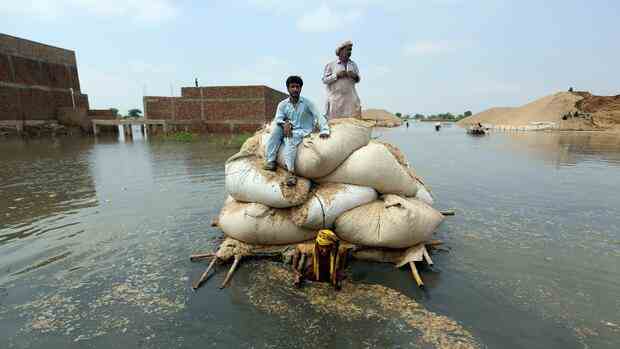When global warming is discussed in Germany these days, it tends to be about the rather soft effects of the climate crisis – for example the fact that the milder weather in this country is meanwhile leading to more and more people only knowing the “white Christmas” from memories . However, regardless of whether this finding is actually true, it is clear that such considerations dangerously downplay the problem.
Because global warming is robbing us in this country of cherished traditions. In other regions of the world it costs human lives, and not in the distant future, but today.
Disasters such as the floods in Pakistan, in which a third of the country was flooded at times in the summer and around 1,700 people died, or the extreme heat in India, where temperatures exceeded 50 degrees at times, are evidence that the earth is changing rapidly .
This is no wonder given the CO2 emissions, which have been increasing almost continuously since industrialization, with a single historical setback in 2020. However, this was mainly due to the corona pandemic – and not because mankind had made any progress in climate protection had.
Top jobs of the day
Find the best jobs now and
be notified by email.
After rising again in 2021, global emissions are expected to rise again in 2022, to unprecedented levels. With this record of failures, it is hardly surprising that activist groups like the Last Generation or Fridays for Future are formulating their demands in an alarmist and increasingly urgent manner.
>> Read also: There is a risk of a power outage – from now until 2029, Germany will have to build six new wind turbines every day
Because alarmism is completely justified at this point: If we continue as before, we will have used up the CO2 budget that we still have for warming below 1.5 degrees in six and a half years. Floods like in Pakistan will then no longer be rare catastrophes, but simply meteorological realities.
Fighting the climate crisis: It will not work without doing without
Experts from the United Nations even fear that the 1.5-degree mark could be reached for the first time in 2026. The expected CO2 emissions alone from all existing coal-fired power plants and those planned for 2022 as a result of the energy crisis should be sufficient over their economic lifetime to consume the remaining CO2 budget of up to 1.5 degrees. Other, also very large CO2 sources, such as gas power plants, agriculture, industry or transport and buildings, are not even taken into account.
In most cases there are technologies to solve the climate problem. However, their implementation is lengthy, complicated and usually very expensive.
However, because we don’t have until 2050 for this, but only a few more years, humanity is in danger of losing the fight against climate change. Anyone who calls for more optimism or even just to believe in technological progress in this situation is at best naive, at worst ignorant.
CO2 reduction must be radically accelerated
Because in order to actually limit global warming to below 1.5 degrees compared to the pre-industrial age, the CO2 reduction must be radically accelerated, and preferably yesterday. A gentle and gradual transformation, as favored by politics and business, can no longer guarantee this. This has harsh consequences.
In the West in particular, politicians must begin to convince the population that it is not possible to make sacrifices – and, if in doubt, strictly demand this instead of relying on price-based voluntariness, as is the case, for example, within the framework of the European CO2 certificate trade. This also includes stopping CO2-intensive imports from those countries that do not take climate protection so seriously. Because even if the West is no longer primarily responsible for global CO2 emissions, the majority of all goods that are produced worldwide still end up here – and not necessarily where the emissions originate.
This creates a special responsibility for the developed nations in Europe, North America and Oceania. On the one hand, they have benefited for most of their existence from being able to build up their economic ascent largely undisturbed by climate concerns on fossil fuels.
>> Read also: The most important climate law in the world almost there
On the other hand, it is precisely the Western industrialized nations that can expect the mildest consequences in the event of global warming of one and a half or even two degrees, such as floods, ice-free Alps and colder winters – while the climate crisis is wreaking havoc in poorer regions such as Southeast Asia or Africa could make areas permanently uninhabitable.
Against this background, it is also completely understandable that many countries in these continents are now demanding climate reparations from those nations that have caused most of the CO2 currently in the atmosphere. The extent of the justified claim is likely to be measured primarily by the extent of the damage that global warming will cause in the years to come.
It is therefore time to pull the emergency brake, regardless of any loss of comfort and prosperity. In the case of the corona pandemic, which is now over and tends to threaten fewer lives than climate change, that finally worked.
More: Energy price crisis, climate change, energy self-sufficiency – the topics of the year at Handelsblatt Green & Energy
